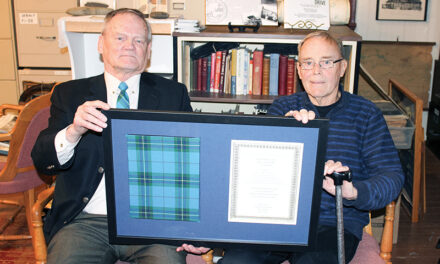Kalynn Sawyer Helmer
Record Staff
WINCHESTER – The Winchester Parmalat plant held a public meeting on Thurs., July 5, at the Joel Steele Community Centre to discuss recent issues and complaints from the community. Before the official meeting got underway, North Dundas Mayor Eric Duncan spoke to the numerous attendees. “This is something that has been talked about for a while; getting better communication with our town’s largest employer. This is an emotional issue and I hope it’s the first of many meetings like this,” Duncan said.
Next up, director of operations Bruce Shurtleff began by outlining the meeting with three main issues: truck traffic, dust and noise and odour.
For truck traffic, Shurtleff recognized the need for a permanent solution and in the short-term, said that trucks have been rerouted to the north on Liscumb Rd. between the hours of 6 p.m. and 6 a.m. Some residents commented that the rerouting had not been followed and Shurtleff told the crowd that measures such as traffic cameras were being implemented to ensure driver compliance. Shurtleff continued to say that in a few weeks when construction was finished on the water treatment plant, they would re-evaluate and consider the Liscumb route as a 24 hour option.
During the question period residents brought up concerns in which truck traffic can hinder emergency vehicles, cause damage to properties and potentially harm residents. Despite demanding a finite date in which construction on a new road would begin, Shurtleff, along with Parmalat Canada vice-president manufacturing Martin Santerre, could not give an exact answer to resident’s concerns. They did however convey the message that it would be soon and it had been made a priority issue.
Next on the list was dust and noise. For dust in the short-term, Shurtleff explained the company has increased dust sweeping and the use of a calcium product to keep dust levels down. A more permanent solution is expected this summer as Shurtleff said they will be paving the gravel area.
The reduction of noise has been an ongoing issue and Shurtleff said the plant has a deal with the Ministry of Environment to decrease noise levels over a number of years. The plant has invested and been replacing the cooling towers with low-level noise technology. The last of which will be installed by the end of the year. Also coming this year will be a 14 foot sound barrier built between the plant and the Gladstone St. homes. While Shurtleff could not give a fixed date for when the construction would begin he did say that once a schedule had been made with the contractor, the residents would be informed.
Finally Shurtleff got to the issue of the odour. Residents within a kilometre or more of the plant have been plagued with foul odours for some time and patience is wearing thin.
Schurtleff explained that as the Parmalat plant has grown, the water treatment plant has stayed the same. The main culprit of the malicious odours is the organic waste. Currently the plant is faced with an abundance of waste and until recently it had nowhere to go.
If the weather cooperates, the plant has a small window in the spring and fall to distribute the waste to agricultural fields to fertilize the soil. However, with weather patterns over the last few years, the window to perform this action has become smaller. As the waste is not spread, it sits in the ponds and odour begins to form.
The Parmalat plant has since turned to a relatively new technology called a Geotube container from the Renfrew based company Bishop Water Technologies. Geotubes are custom fabricated to each project and are a dewatering solution. The tube at Parmalat, which was first filled on the day of the public meeting, will separate solid from liquids and allow clean water to drain from the tube leaving only soil that can be transported and used at a farmer’s leisure. Shurtleff estimated 30 days to remove the current waste from the ponds. “It’s a very interesting technology, it’s practical, it’s meeting our need and allowing us to deal with our solid waste in an efficient manner,” said Shurtleff.
Also to help reduce overall waste is a Dissolved Air Floatation System (DAF) installed on the grounds. This system will receive all organic waste before it reaches the water treatment plant. The DAF will separate roughly 50 per cent of the solid waste before the rest moves on. What is left is sent to a bioreactor to be used to make energy. Shurtleff said they expect the machine to begin commissioning within three weeks. While residents were concerned this would mean more truck traffic, Shurtleff said it would only require one more truck per day that would use the north passage.
Shurtleff’s solutions were welcomed news at the meeting and while residents may be skeptical to see if they work, their pleas had been acknowledged.
After all the community’s main concerns had been heard, a few were eager to know the future prospects of the Parmalat plant and it’s owner Lactalis’ commitment to Canada with the current trade wars. Shurtleff and Santerre both reviewed the current investments made in the plant and the future investments already in the works to continue to modernize the operation. The pair suggested that with such hefty investments, residents would be assured that Lactalis is committed to continuing on with the plant in Winchester. “We have quality milk, quality employees, we are the biggest cheese plant in Canada and in a good position to compete nationally and internationally. We are here for the long-term.”








